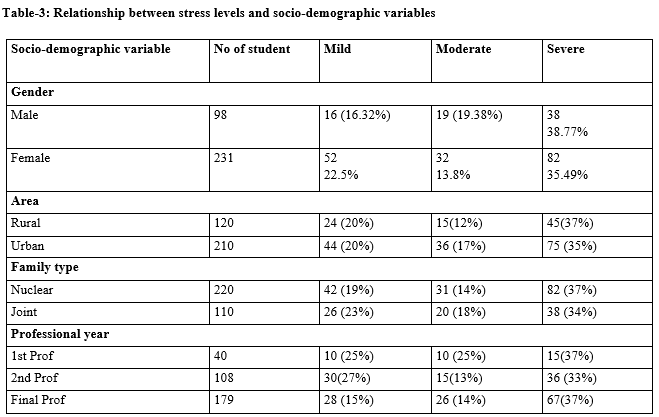A cross sectional study to estimate the psychological stress level in medical students during Covid-19 pandemic
Abstract
Introduction: Stress and anxiety have been a common topic of discussion among the medical students in normal circumstances owing to the burden of immense studies, clinical rotations, regular exams and assessments.
Material and methods: A cross sectional study consisting of 330 medical students studying in various medical colleges in various states like Himachal, Karnataka, Haryana, Rajasthan, Bihar, Punjab, Delhi etc. was conducted using online forms that were shared in various WhatsApp college groups. The questionnaire was a simple 10 question form consisting of the Kessler's psychological distress scale questions. The stress levels were defined according to the Kessler's psychological distress scale k10.
Results: The results of the study showed that 72.5% of total participants suffered from mild to moderate levels of stress with 20.6% students suffering from mild stress, 15.5% from moderate stress and significant 36.4% from severe stress. Similarly, various socio-demographic determinants have also been studied for any relation to these high stress levels. The treatment seeking behaviour among medical students also reflected poorly when it came to seeking help from health professionals.
Conclusion: It was found that during the covid-19 lockdown, medical students suffered from severe stress levels which is a topic of concern for the authorities and calls for a timely intervention to control the situation. The treatment seeking behaviour is also a topic of concern as medical students being most exposed to the knowledge of mental health do not themselves prefer to take treatment from a health professional.
Downloads
References
Selye, H. The Stress of Life, McGraw-Hill, New York, 1956.
Xiang YT, Yang Y, Li W, Zhang L, Zhang Q, Cheung T, Ng CH. Timely mental health care for the 2019 novel coronavirus outbreak is urgently needed. The Lancet Psychiatry. 2020 Mar 1;7(3):228-9.
World Health Organisation. WHO/2019-nCoV/Mental Health/2020.1
Kessler RC, Andrews G, Colpe LJ, Hiripi E, D K MR, T NORMAND SL, WALTERS EE, Zaslavsky AM. Short screening scales to monitor population prevalence and trends in non-specific psychological distress. Psychological medicine. 2002 Aug 1;32(6):959.
Victorian Population Health Survey. Melbourne: Department of Human Services, Victoria; 2001.
Center for Disease Control and Prevention. Coronavirus Disease impact on Older Adults. Center for Disease Control and Prevention. 2020.
Unicef. Coronavirus (COVID-19) parenting tips [Internet]. Unicef. 2020. p. 1–30. Available from: https://www.unicef.org/coronavirus/covid-19-parenting-tips
Dangi Ravi Rai, Dewett Parul, Joshi Pallav. Stress Level and Coping Strategies Among Youth During Coronavirus Disease Lockdown in INDIA. Aegaeum Journal. 2020;8(7):605-615
Hawryluck L, Gold WL, Robinson S, Pogorski S, Galea S, Styra R. SARS control and psychological effects of quarantine, Toronto, Canada. Emerg Infect Dis. 2004;10(7):1206–1212.
Sultan Ayoub Meo, Abdulelah Adnan Abukhalaf, Ali Abdullah Alomar, Kamran Sattar, David C Klonoff.COVID-19 Pandemic: Impact of Quarantine on Medical Students’ Mental Wellbeing and Learning Behaviors. Pak J Med Sci. 2020 May; 36(COVID19-S4): S43–S48.

Copyright (c) 2021 Author (s). Published by Siddharth Health Research and Social Welfare Society

This work is licensed under a Creative Commons Attribution 4.0 International License.


 OAI - Open Archives Initiative
OAI - Open Archives Initiative


